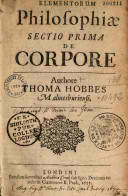Hobbes, Thomas. Human Nature and De Corpore Politico. Edited by J. C. A. Gaskin. Oxford: Oxford University Press, 1994.
Thomas Hobbes’s De Corpore (Latin for “On the Body”), published in 1655, is the first part of his trilogy on philosophy, which includes De Homine (“On Man”) and De Cive (“On the Citizen”). In De Corpore, Hobbes develops the foundational principles of his materialist philosophy, aiming to construct a systematic and scientific understanding of the natural world based on mechanics and geometry. This work sets the stage for his later explorations of human nature and political society by establishing the physical and metaphysical groundwork for his theories.
The text is divided into four parts:
1. Logic (Computation and Ratiocination): Hobbes examines reasoning and language as tools for scientific inquiry. He famously defines reasoning as “computation,” emphasizing that knowledge results from the addition and subtraction of ideas.
2. Philosophy of Nature: Hobbes articulates his materialist view that all phenomena in the natural world, including motion and change, can be explained through physical principles. He rejects Aristotelian metaphysics and instead adopts a mechanistic approach.
3. Geometry and Mathematics: Hobbes discusses the foundational role of geometry and mathematics in understanding the natural world. For Hobbes, mathematical reasoning is the ideal method for acquiring clear and certain knowledge.
4. Physics and First Principles: Hobbes applies his materialist principles to the study of physical phenomena, addressing topics such as motion, time, space, and causality. He argues that all bodies, including human bodies, obey the same mechanical laws.
De Corpore serves as the philosophical underpinning of Hobbes’s entire system, linking his scientific inquiries with his later analyses of human behavior and political structures in De Homine and De Cive. While its technical and mathematical sections make it one of Hobbes’s most challenging works, De Corpore is crucial for understanding his ambition to create a unified, scientific account of reality based on materialism and rational inquiry.
